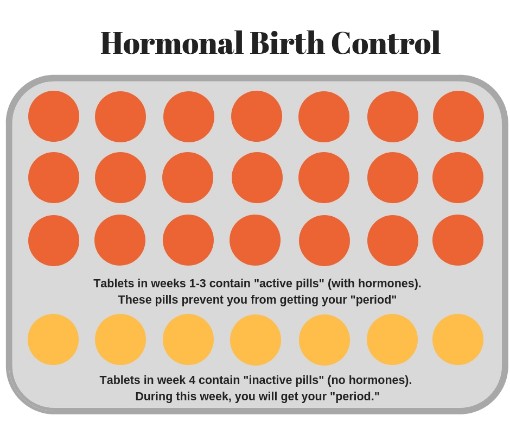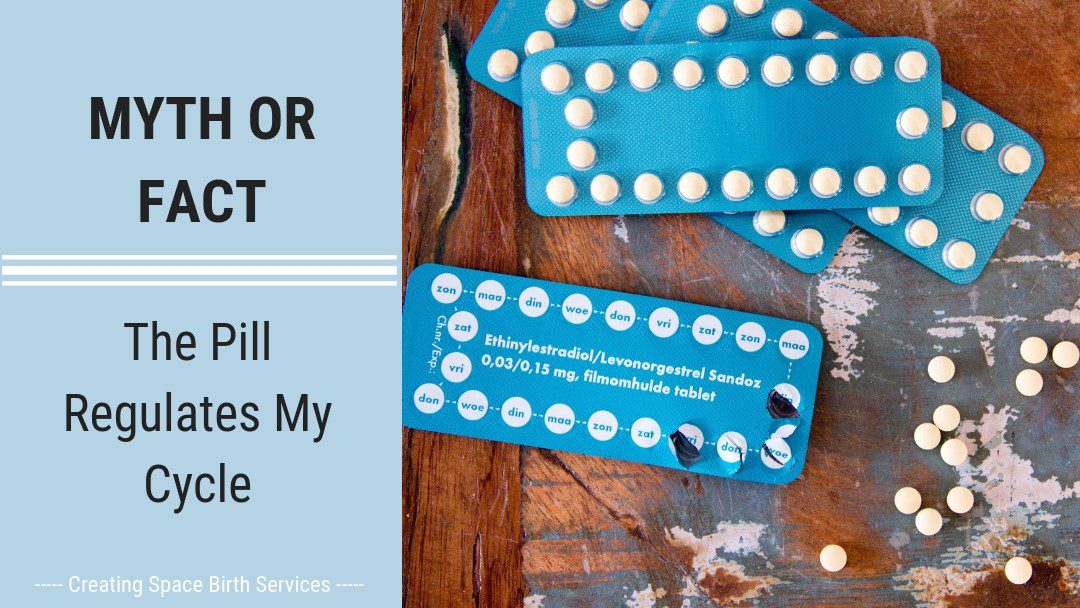“I used to have really irregular cycles. Since I’ve been on the pill, my period comes every 28 days. It’s great because being on the pill has regulated my cycles!”
Is it true that hormonal birth control, such as The Pill, can help regulate a woman’s menstrual cycle? The answer is NO. Hormonal birth control does not regulate your cycle. However, most women who begin taking the pill will see a “period” every 28 days.
If your period occurs like clockwork WHILE ON THE PILL, how is it a myth that hormonal contraception regulates your menstrual cycle?
Let’s take a minute and look at how The Pill prescription actually works.
A typical package of birth control pills contain 28 tablets. The first 3 weeks of tablets (21 pills) contain hormones. The types of hormones (usually artificial estrogen and progestin or progestin only) and dosage can differ depending on the type of pill you have been prescribed. The last week of tablets (7 pills) are placebo pills. Placebo pills are equivalent to sugar pills — meaning they have no effect on you, your body or your cycle. The bleeding that occurs at the end (or close to the end) of the 28 day pill cycle is called withdrawal bleeding (sometimes called breakthrough bleeding). Withdrawal bleeding is not a “true period.” It is your body’s response to not receiving the artificial hormones you have been getting from the hormone-containing tablets during the first 21 days.

The man-made hormones contained in The Pill inhibit the natural cyclical hormone changes and body responses that would otherwise occur during the menstrual cycle. The pill is designed to prevent ovulation. Ovulation is when the follicle that has been developing in the ovary releases an egg. The egg is now ready to meet sperm and implant into the uterus. If implantation does not take place, a period starts, on average, 12 days following ovulation. If ovulation does not occur (which it won’t if your hormonal birth control is working correctly), then a woman can not have a “true period.”
The Pill also changes the type of cervical mucus created by the body. The altered cervical mucus makes it difficult for sperm to go through the cervix and fertilize an egg. Hormonal contraceptives can also interfere with the natural lining in the womb, thus preventing pregnancy in the unlikely scenario that an egg was fertilized.
In other words, hormonal birth control completely suppresses your natural cycle.
The Pros and Cons of the Pill
I encourage you to take the time to do your own research to determine if the benefits of the Pill outweigh the drawback for your personal situation. On the surface, the pill might seem to be an easy choice. It can be seen as a simple solution with little energy or time required to have the benefits of avoiding pregnancy. However, from a natural perspective, hormonal birth control is not an effective long-term solution for your gynecological health. And in most cases, taking birth control is counterproductive to solving cycle problems. The birth control pill (and other hormonal contraception) include many side effects. These include:
- Changes in menstrual cycle, including no menstrual cycle and mid-cycle bleeding
- Nausea
- Mood changes
- Worsening of Migraines (mostly due to estrogen)
- Weight gain and breast tenderness
- Rare but dangerous risks include blood clots, heart attack, high blood pressure, stroke and an increased risk of cancer.
For more information on non-hormonal birth control options, reach out to a FertilityCare Practitioner in your area. Charting your cycles with a Practitioner, paired with a care management plan from a doctor who specializes in NaProTECHNOLOGY, is an alternative to using the birth control pill. Charting with Creighton can help you find answers to gynecological problems such as heavy periods, irregular cycles, PMS, endometriosis, PCOS and more. Monthly charting can also be used to help achieve or avoid pregnancy.
References:
- Birth Control. (2005-2018). WebMD. Retrieved from: https://www.webmd.com/sex/birth-control/birth-control-pills
- Birth Control Pills – overview. (Reviewed Jan 14, 2018). MedlinePlus. Retrieved from: https://medlineplus.gov/ency/article/007460.htm
- Oral Contraceptives and Cancer Risk. (Reviewed Feb 22, 2018). National Cancer Institute. Retrieved from: https://www.cancer.gov/about-cancer/causes-prevention/risk/hormones/oral-contraceptives-fact-sheet
- Unleashing the Power of a Woman’s Cycle. (2018) NaProTECHNOLOGY. Retrieved from: https://www.naprotechnology.com/
- What is NaProTECHNOLOGY? (2017). FCCA. Retrieved from: https://fertilitycare.org/what-is-naprotechnology
- What is the CrMS? (2018). CREIGHTON MODEL FertilityCare System. Retrieved from: https://www.creightonmodel.com/index.html
Hi. I am a Birth Doula, Childbirth Educator and FertilityCare Practitioner (FCPI). I specialize in maternal mental health, birth trauma, past abuse and fertility care. My passion is helping moms overcome difficult birth experiences so they no longer feel invalidated from their birth; so they can stop the cycle of self-blame and the flood of negative memories; and so they can accept their birth experience in order to better bond with their children and partner, live without shame and regret manifesting in anger and withdrawal, and find understanding and healing from their birth narrative. I also provide natural fertility care options to women and couples by teaching the Creighton FertiiltyCare Model. Connect with me now


Recent Comments